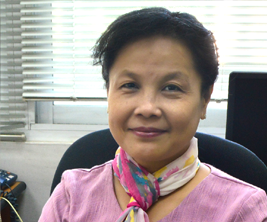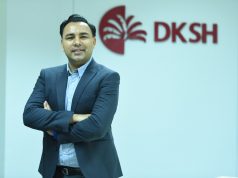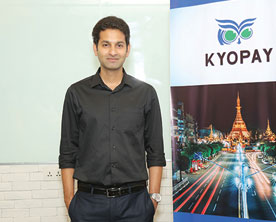Name : Daw Tin Tin Htwe Position : Principal
College : National Management College
(NMC)
MI : How did you begin your career in education? How did you get your cur- rent position?
To be honest, my dream is not to be a teach- er. However, my career began in education by fulfilling my friend’s dream of becoming a tutor. I was upset because my friend did not become a tutor but I did. Although that is not my hobby, I always try my best.
I started working at the Commerce Depart- ment of Yangon Institute of Economic (YIE). In teaching, I always think which ways of teaching methods students can understand more. When I work, I always do the best to satisfy the person who assigned me. Then I was promoted step by step at the commerce department from a tutor position and then became assistant lecturer.
In 1995, MBA degree was launched for first time locally. It separated Management Study Department (MSD) from Commerce Department. I joined the MSD where I be- came assistant lecturer and then lecturer. Then University of Economic was divided into three branches in different cities; Yan- gon, Mon Ywar and Meikhtila. After I spent over 15 years as a lecturer with YIE, I got a promotion to be an associate professor in Mon Ywar and Meikhtila. I didn’t go there since I was born, grown up and lived in Yan- gon. I could not exchange my lecturer life with anything else.
Founder of MSD is Professor Daw Ye Myint. She developed a new culture that was total- ly different from Commerce department’s culture. I did not know it at that time. But I know now that every experience that I got is from there. I have learned a lot there.
When MBA was first launched, I felt that I only got MCom degree and I should know more than my MBA students as I was a lec- turer. At that time, there was no MBA degree holder except Professor Daw Ye Myint who got MBA degree from Stanford Universi- ty and many teachers wanted to study ad- vanced qualifications. Moreover, if we tried to go to further study that was not nominat- ed, we had to take an entrance exam. So I went to Hiroshima University to get MBA (economics), specialized in development finance. When I came back, I was still a lecturer. I realized there were relations be- tweentheoriesofbusinessmanagementand economics. That is one of my experiences in
lecturer life. I always appreciated MBA pro- gram and founder Daw Ye Myint.
Then I was assigned as an associate profes- sor at Commerce department at the Univer- sity of Economic in Meikhtila. I knew that I did not always have to stay in Meikhtila and I started thinking the university could keep going without me. The answer is most of the teachers from commerce department are from upper Myanmar and they don’t want to come to Yangon. So I targeted them. If they get further study, the department could continue with them. Then I motivated them to get degree from International universi- ties. At present, there are five teachers who studied abroad; 1 PhD (from Thailand) and 4 masters (1 from Japan, 1 from Thailand, etc). I assumed that these 5 people can lead the university.
After I served as an associate professor for about 2 years, then I became professor. When I could demonstrate that the univer- sity can run without me, I was promoted as the principal. I moved to the NMC at the end of May in 2014, second semester of 2013-14. MI: How do you motivate upper Myanmar teachers to study in foreign countries?
Only people who study aboard are aware that they are the little frogs inside a well (who have never seen the outside world). I always compare the differences (thoughts and living style) between people who stay here with the people who came back from foreign studies. I started with a research program. When they do the research, peo- ple will be more inquisitive. Firstly, I taught them research methodology. Then, I coach them how to do the practical research. They had to do everything themselves from ques- tionnaire to analysis stage. As a result, they become curious people.
I do not mean that you will know everything by going on a further study. But a person will gradually understand that he knows noth- ing. That is an important point and when he realizes that, he will start self-learning.
MI: What changes have you intro- duced at the NMC since your arrival?
When I first sat down on a chair at NMC, I wondered why many people did not know NMC, even Yangon citizens do not know. I knew the NMC students are clever since I taught the BBM classes, one of the ma- jors from NMC which includes Public Re- lation (PR) and marketing subjects. Then, I thought what I should do to make NMC more popular. At present, we can start doing PR by introducing the NMC to the media. Second is program by program in- troduction and analyzing how the programs are penetrating in the market. Why can’t NMC be famous? The answer is that if only theories are taught in a classroom, students will only know theories.
Therefore, my first idea was to collaborate with the industry to combine theory and business experience. It is a win-win situ- ation by coordinating with industry. The businessmen will know students’ abilities and they will know the role of students. Then, they will call in students to their com- panies.
While I am thinking of that, Country Di- rector of Unilever Myanmar U Zaw Myo Hlaing asked me “Principal, what can I do for NMC?” He is also my pupil. So, I replied I want him to organize seminars for the students given by the businessmen. I also wanted set up factory visits and internship program. Then I got a chance to implement my ideas.
I also invite famous businessmen who are former MBA students to offer seminars at the college. We have a seminar once a week for this academic year. The experts and top- ics will be different for each of the majors. For example, for International Relation (IR) subject, I will invite experts from the IR field. They will talk about their experiences of their practical world. I set 2 hours for each semi- nar; 1 hour for speaker and 1 hour for ques- tion and answer session in which students and experts can discuss interactively.
MI: What are the extra curriculums of NMC?
There are tournaments, fresher welcome parties and other school activities. For ex- ample, NMC Red Cross association was formed and office of Myanmar Red Cross Society taught students and supported first aid boxes last holiday. In the past, people who grew up under socialist system were selfish. After Nargis storm, voluntary ser- vices became popular among youths. Red Cross is also a voluntary NGO. NMC stu- dents took an interest in it and joined the association and classes. Occasionally, we have activities like that.
MI: Could you tell us more about Na- tional Management College and its history?
National Management College was estab- lished by U Myint Swe who managed Work- ers’ College in 2004. As for me, NMC is a comprehensive college because it was built by 2 programs; Business Management Pro- gram (BBM) and English for Professional Purposes (EPP). BBM affiliates with YIE and EPP connects with Yangon University. NMC offered 2 degrees that affiliate with 2 univer- sities. No other university offers such thing. Journalism major was launched in 2007 ac- cording to the need in media field in Myan-
mar. Next one is tourism. It was launched in 2012 as tourism sector booms and needs human resources. These two are also affili- ated with the Yangon Unversity. Currently, there are 4 majors.
Moreover, NMC offers diploma course like post-graduate diploma in tourism studies and management and certificates and de- grees about business management, Infor- mation Technology (IT). Private sectors are cooperating with the NMC such as STI (affiliate with Hong Kong Open Uni), MPBC
(affiliate with Assumption University, Thai- land) that offers certificate for marketing management and Winner group of company and KMD that offer certificates for IT.
I have already discussed with Professor Daw Margaret Wong to start post-graduate di- ploma in Media Management in June 2015. The diploma will be half about journalism and half about business management. So, I expect that students will be interested and I believe it can penetrate the market.
MI: NMC is smaller in the size of stu- dents and teaching staff than other governmental universities. So, do you have any plan to expand?
BBM program was expected to have about 150 students but only 83 attended. For EPP, 50 were accepted but only 29 registered. For Tourism, 150 were selected but only 74 joined. For Journalism (JNL), 50 were chosen and 15 attended. This was because of scholarship program of Yangon Univer- sity in previous year and students were con- fused what to choose.
This year the admission mark for the BBM was 474 and 306 students have been ac- cepted. EPP was limited by 469 marks and 115 students have been accepted. Tourism was423 marks and 394students have been accepted. JNL major was only for students who score over 400marks and we have ad- mitted 101 students in 2014-2015 year. So I would like to apologize to students and teachers because the classroom size will be larger than we expected.
For the long run, I will pay more attention to bachelor degree programs. I want to affiliate with international universities for master degrees.
MI: NMC has been succeeding for 10 years and what are achievements so far?
I only arrived at this college this year and I do have anything that I can call my own achievements. However, I heard that NMC students are pleased with the industries which come to cooperate with the NMC. We have talented students who can be taught ef- fectively. This is one of the successful cases of NMC. In the market, NMC students have competitive positions. As I have already said, I do have the programs which I believe will penetrate more and increase the market.
MI: How could you describe the “suc- cess of a college”?
As for me, success of an organization, in- cluding a college, depends on “leadership”. If it has good leadership, it will succeed. So, we must try to be good. Here, my main theme is encouragement/empowerment. By empowering people, they will start thinking and make decisions and new leaders will emerge. A leader has to create a situation in which the organization can run even without him. This is called empowerment.
MI: Do you have any plan to motivate teachers from NMC like teachers from Meikhtila?
Yes. I have a plan to motive people. I always ask this question “What are you doing?” to every person including teachers, students, MBA participants, etc when I see them. I ask because people don’t evaluate themselves. They don’t know what they do and what is happening around them. So, I warn them by asking question like “how long is your teach- ing experience and what are you doing with- in these years?” Some teachers run away from me as they cannot answer my question. If they do not come, I find them and ask the question. I push them by that way.
MI: What are the long term plans for NMC now that it has 4 major?
We are proposing NMC to become a uni- versity. If it becomes a National Manage- ment University (that’s just my big dream), each major will become a business school; school of management, English proficiency, tourism and journalism. Then I want to run master degree programmes by linking with international universities.
MI: How do you prepare National Management College to compete with private colleges?
At present, NMC is already competing with private schools. I try to offer full facilities at the NMC as a university. For teaching style, I set up computer, projector, wall screen, etc in every classroom to teach by PowerPoint slide presentation from this year. But NMC does not have MPT (Myanmar Posts and Telecommunications) fiber optic internet line yet. When we get it, teachers and students can use internet in the classrooms and online assignments can be done in the classrooms.
NMC must lead with one step ahead of other private schools. So I am cooperating with the industry. Not only we have teach- ing classes, but also organize seminar and practical assignments. I approach teaching through practical style.
MI: How do you ensure NMC grad- uates are equipped with necessary skills to excel in the modern work place?
I always ask the businessmen who hire our NMC students and come to NMC to give lec- tures for feedback, for example: Unilever. I received replies that the students have real talent. By this means, I ensure that our stu- dents are demanded by the market and they will succeed in the real world.
MI: How do you feel about Myanmar’s education sector right now?
Change is taking place because of the reform process. But it cannot change instantly. Re- forms have to be done by evolution not rev- olution and it applies to education as well. Our country gradually enjoys freedom and it is totally different from the last 10 years. Now we can do interviews, cooperate with companies, universities and also meet with foreigners.
To talk about education sector, I start think- ing from the school level. As for me, it should go university by university. Each university has to look at the long run and progress towards the goal step by step. I think each university has to start changing with its own strategy, like the NMC. It may take time like 10-20 years before the success. Once each of the universities reaches their own goals, the whole education sector is successful.
MI: What is your opinion regarding students’ demonstration against the new education bill?
I constantly ask myself what I want to do. So, I want to pass this message to these stu- dents to think upon the following concept. Firstly, “make sure you know exactly of the real situation”. Second, think carefully “what you want to do” based upon the first. Third, widely consider “how you would like to do it”.
MI: If you could make one major change to government policy that re- lates to education sector, what would it be?
Every school has to think what they can do to become successful. If all schools suc- ceed, the education sector will also succeed.
Only when we try, we will gain autonomy. Although we wish to gain autonomy, we must also ask “Are we ready?” Readiness is known by our performance. Autonomy is gradually given and we have to be ready when we get full of it.
MI: Could you tell us the barriers when you manage your organization.
I am very flexible. If I face with a barrier in one way, I find the other way. On the other hand, if plan A does not work, there will be Plan B. I will not wait and construct a road the way that has trouble. That’s my philos- ophy.
MI: I heard that you tried to build a radio studio for JNL last year and do you have any specific programs for other majors?
It depends on a specific major and I have received offers from businessmen from each field. I tried to build radio studio for practical assignment for JNL as I could afford it. However, I don’t have the funds for BBM and tourism. For tourism, we need to build a hotel school. What we can do is to collaborate with companies. I have also made offers to the businessmen from hotel and tourism field.
MI: Do these 4 majors have student exchange program?
Yes. Currently, there is a student exchange program for Journalism, Jenesys program to Japan. Also tourism major has a pro- gram. BBM major have no program at present.
I am willing to do students and staff ex- change program and start linking with foreign universities. Our college is smaller than others and oversea universities offer the exchange program to the big universi- ties.
MI: What would be your advice for young people who confuse about choosing major in College/University after their Matriculation Examination?
I want to advise to ask yourself “what you want to do” as the above. Then, think which major to choose. While thinking options, consider them independently of parents’ control. If you depend too much on the par- ents, your major will be the major that your parents like, not yours. Then, you may have to struggle in the subject you don’t like.
While thinking (higher education) options, consider them independently of parents’ control.










